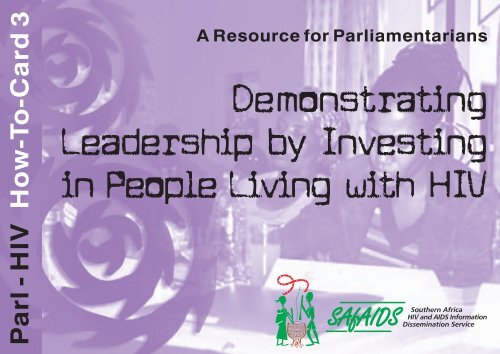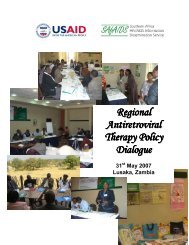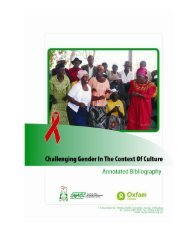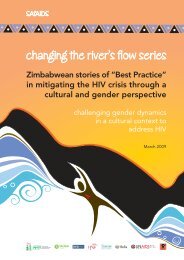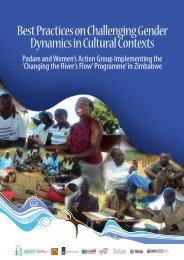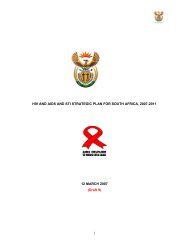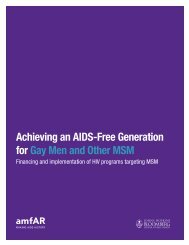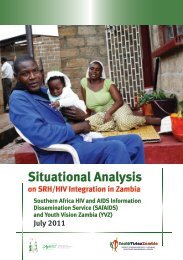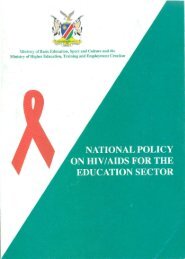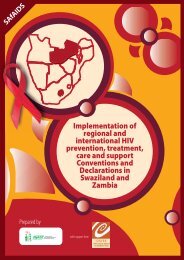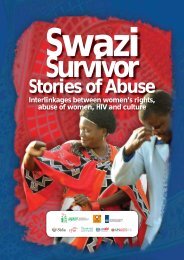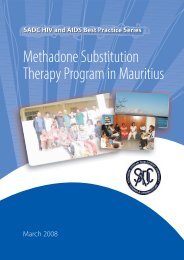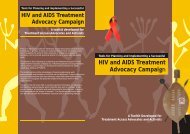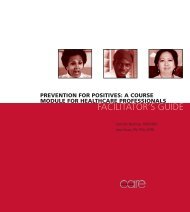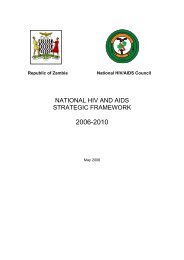Demonstrating Leadership by Investing in People Living ... - SAfAIDS
Demonstrating Leadership by Investing in People Living ... - SAfAIDS
Demonstrating Leadership by Investing in People Living ... - SAfAIDS
Create successful ePaper yourself
Turn your PDF publications into a flip-book with our unique Google optimized e-Paper software.
Parl - HIV How-To-Card 3<br />
A Resource for Parliamentarians<br />
<strong>Demonstrat<strong>in</strong>g</strong><br />
<strong>Leadership</strong> <strong>by</strong> <strong>Invest<strong>in</strong>g</strong><br />
<strong>in</strong> <strong>People</strong> Liv<strong>in</strong>g with HIV
<strong>Demonstrat<strong>in</strong>g</strong> <strong>Leadership</strong> <strong>by</strong><br />
<strong>Invest<strong>in</strong>g</strong> <strong>in</strong> <strong>People</strong> Liv<strong>in</strong>g with HIV
What is the purpose of the How-to Cards for<br />
parliamentarians?<br />
The Parl-HIV “How-to Cards” support you as a member of Parliament with<br />
practical HIV and AIDS <strong>in</strong>formation which you can use as a reference tool<br />
dur<strong>in</strong>g parliamentary debates and when engag<strong>in</strong>g with constituency stakeholders.<br />
They boost your HIV and AIDS knowledge and strengthen your oversight,<br />
lawmak<strong>in</strong>g and representational role <strong>in</strong> address<strong>in</strong>g HIV and AIDS issues<br />
This card focuses on the critical strategy of build<strong>in</strong>g people-centred HIV<br />
responses. Where the personal experiences of people liv<strong>in</strong>g with HIV<br />
(PLHIV) have been translated <strong>in</strong>to help<strong>in</strong>g to shape responses<br />
to HIV, significant success has been recorded <strong>in</strong><br />
combat<strong>in</strong>g the pandemic.<br />
What is MIPA?<br />
Orig<strong>in</strong>ally, the term ‘Greater Involvement of <strong>People</strong> Liv<strong>in</strong>g<br />
with HIV’ (GIPA), was used, but the preferred term now<br />
is MIPA (Mean<strong>in</strong>gful Involvement of <strong>People</strong> Liv<strong>in</strong>g with<br />
HIV). The pr<strong>in</strong>ciple was adopted <strong>by</strong> 42 countries at the<br />
1
1994 Paris AIDS Summit and formally adopted <strong>by</strong> UNAIDS <strong>in</strong> 1999,<br />
demonstrates commitment towards recognis<strong>in</strong>g the role of people<br />
liv<strong>in</strong>g with HIV <strong>in</strong> build<strong>in</strong>g ethical and effective national, regional<br />
and global responses to the epidemic. It is based on the premise<br />
that people liv<strong>in</strong>g with HIV understand each other's situation better<br />
than anyone else and are often best placed to counsel one another<br />
and to represent their needs <strong>in</strong> decision and policy-mak<strong>in</strong>g forums.<br />
Use of the term ‘mean<strong>in</strong>gful’ offsets the risk that PLHIV will be<br />
<strong>in</strong>volved merely on a tokenistic basis, without real <strong>in</strong>fluence on<br />
processes.<br />
MIPA means <strong>in</strong>vestment<br />
MIPA is built around a vision aimed at <strong>in</strong>vest<strong>in</strong>g <strong>in</strong><br />
people liv<strong>in</strong>g with HIV, <strong>in</strong>vest<strong>in</strong>g <strong>in</strong> the capacity<br />
build<strong>in</strong>g/advocacy role of PLHIV groups/networks,<br />
<strong>in</strong>vest<strong>in</strong>g <strong>in</strong> PLHIV leadership, and <strong>in</strong>vest<strong>in</strong>g <strong>in</strong><br />
measurable accountability mechanisms.
Despite the efforts of the United Nations, little has been done to date to<br />
<strong>in</strong>tegrate GIPA pr<strong>in</strong>ciples <strong>in</strong>to regional and national responses. GIPA was<br />
primarily promoted <strong>by</strong> a few <strong>in</strong>dividuals liv<strong>in</strong>g with or affected <strong>by</strong> HIV and<br />
AIDS. Often an <strong>in</strong>dividual goes public about their serostatus or their experiences<br />
with the <strong>in</strong>fection <strong>in</strong> the hope of giv<strong>in</strong>g it a human face and voice, and<br />
alter<strong>in</strong>g the public’s attitude towards people liv<strong>in</strong>g with the disease. GIPA<br />
has tended to be tokenistic, thus the movement towards the mean<strong>in</strong>gful<br />
<strong>in</strong>volvement of people liv<strong>in</strong>g with or affected <strong>by</strong> HIV (MIPA). MIPA argues<br />
that people affected or <strong>in</strong>fected <strong>by</strong> HIV can make a mean<strong>in</strong>gful<br />
contribution to the response to the epidemic. Further to this,<br />
it calls for the creation of space with<strong>in</strong> society and exist<strong>in</strong>g<br />
structures for the mean<strong>in</strong>gful <strong>in</strong>volvement and active<br />
participation of people <strong>in</strong>fected or affected <strong>by</strong> HIV, <strong>in</strong> all<br />
aspects of HIV-related responses.<br />
2
Do people liv<strong>in</strong>g with HIV have<br />
rights?
Yes they do!<br />
<strong>People</strong> liv<strong>in</strong>g with HIV are entitled to the same human rights as everyone<br />
else, as spelt out <strong>in</strong> the 1945 United Nations Human Rights Charter.<br />
Such rights <strong>in</strong>clude the right to access appropriate services; gender equality,<br />
self-determ<strong>in</strong>ation and participation <strong>in</strong> decision-mak<strong>in</strong>g which affects their<br />
quality of life, and freedom from discrim<strong>in</strong>ation.<br />
Rights come with responsibilities. In view of HIV, everyone has the right to<br />
be safe and protected from <strong>in</strong>fection and simultaneously has the responsibility<br />
to prevent <strong>in</strong>fect<strong>in</strong>g or re-<strong>in</strong>fect<strong>in</strong>g another person with HIV. The wilful<br />
In order for PLHIV to mean<strong>in</strong>gfully access<br />
their sexual and reproductive health<br />
rights and responsibilities, governments<br />
have an obligation to enact laws and<br />
policies that protect the rights of PLHIV,<br />
and subsequently provide structures and<br />
mechanisms that allow PLHIV to access<br />
these rights, as well as the appropriate<br />
related goods and services<br />
3<br />
transmission of HIV<br />
needs to be avoided <strong>by</strong><br />
all <strong>in</strong> society to ensure that<br />
the rights of people liv<strong>in</strong>g<br />
with HIV are protected. It<br />
is the responsibility of all<br />
(<strong>in</strong>fected and affected) to<br />
ensure that these rights<br />
are observed and<br />
protected.
Sexual and reproductive health<br />
rights for PLHIV
Sexual and reproductive health rights for PLHIV have been a source of controversy<br />
among key stakeholders, <strong>in</strong>clud<strong>in</strong>g governments, over the past few years.<br />
<strong>People</strong> liv<strong>in</strong>g with HIV have sexual and reproductive health rights and these<br />
<strong>in</strong>clude the right to health care and <strong>in</strong>formation and the right to<br />
nondiscrim<strong>in</strong>atory availability and accessibility of health services.<br />
Sexual and reproductive rights also <strong>in</strong>clude the right of all to make decisions<br />
concern<strong>in</strong>g reproduction, ‘free of discrim<strong>in</strong>ation, coercion, and violence’, as<br />
expressed <strong>in</strong> human rights documents. Of central importance are the rights to<br />
autonomy and privacy <strong>in</strong> mak<strong>in</strong>g sexual and reproductive decisions, as well<br />
as the right to <strong>in</strong>formed consent and confidentiality <strong>in</strong> relation to health services.<br />
How can you <strong>in</strong>volve PLHIV <strong>in</strong> HIV and<br />
TB responses?<br />
<strong>People</strong> liv<strong>in</strong>g with or affected <strong>by</strong> HIV can contribute to HIV and AIDS responses<br />
at <strong>in</strong>dividual, organisational, national and regional levels. Their <strong>in</strong>volvement<br />
can be further harnessed <strong>in</strong> various facets of human livelihood, <strong>in</strong>clud<strong>in</strong>g sociocultural,<br />
political and economic environments. The diagram below shows some<br />
of the ways people liv<strong>in</strong>g with HIV can be <strong>in</strong>volved <strong>in</strong> this response.<br />
4
How can <strong>People</strong> Liv<strong>in</strong>g with HIV be<br />
<strong>in</strong>volved?
How can people liv<strong>in</strong>g with HIV be <strong>in</strong>volved?<br />
Treatment<br />
roll-out and preparedness<br />
<strong>People</strong> liv<strong>in</strong>g with HIV support<br />
treatment roll-out through educat<strong>in</strong>g<br />
others on treatment options, side effects<br />
and adherence, and are <strong>in</strong>volved as<br />
home-based and community<br />
health-care workers.<br />
Personal<br />
<strong>People</strong> liv<strong>in</strong>g with HIV are actively<br />
<strong>in</strong>volved <strong>in</strong> their own health and welfare.<br />
They take an active role <strong>in</strong> decisions about<br />
treatment, self education about therapies,<br />
opportunistic <strong>in</strong>fections and adherence,<br />
and positive prevention.<br />
Campaigns<br />
and public speak<strong>in</strong>g<br />
<strong>People</strong> liv<strong>in</strong>g with HIV are<br />
spokespersons <strong>in</strong> campaigns or<br />
speakers at public events<br />
and <strong>in</strong> other arenas.<br />
SOURCE: UNAIDS Policy Brief: The Greater <strong>in</strong>volvement<br />
of <strong>People</strong> Liv<strong>in</strong>g with HIV/AIDS (GIPA) (2007)<br />
Policy-mak<strong>in</strong>g process<br />
<strong>People</strong> liv<strong>in</strong>g with HIV participate<br />
<strong>in</strong> the development and monitor<strong>in</strong>g of<br />
HIV-related policies at<br />
all levels.<br />
Involvement<br />
of <strong>People</strong> Liv<strong>in</strong>g<br />
with HIV<br />
Programme<br />
development and implementation<br />
<strong>People</strong> liv<strong>in</strong>g with HIV provide knowledge and<br />
skills towards universal access through participation<br />
<strong>in</strong> the governance of global organisations such as<br />
UNAIDS and the Global Fund and <strong>in</strong> the choice,<br />
design, implementation, monitor<strong>in</strong>g and<br />
evaluation of prevention, treatment,<br />
care and support programmes<br />
and research.<br />
Advocacy<br />
<strong>People</strong> liv<strong>in</strong>g with HIV advocate<br />
law reform, <strong>in</strong>clusion <strong>in</strong> the research<br />
agenda and access to services, <strong>in</strong>clud<strong>in</strong>g<br />
treatment, care and support; and for<br />
the resource mobilisation for networks<br />
of people liv<strong>in</strong>g with HIV and for the<br />
broader response.<br />
5<br />
<strong>Leadership</strong> and support,<br />
group network<strong>in</strong>g and shar<strong>in</strong>g<br />
<strong>People</strong> liv<strong>in</strong>g with HIV take leadership of<br />
HIV support groups or networks, seek<br />
external resources, encourage participation<br />
of new members or simply participate <strong>by</strong><br />
shar<strong>in</strong>g their experiences<br />
with others.
What MIPA commitments have<br />
governments from southern<br />
Africa made?
The need for the mean<strong>in</strong>gful <strong>in</strong>volvement of people liv<strong>in</strong>g with HIV and<br />
AIDS (MIPA) was reaffirmed <strong>in</strong>:<br />
• The Abuja Declaration on HIV and AIDS (2006): <strong>by</strong> emphasis<strong>in</strong>g<br />
the human rights approach to HIV.<br />
• SADC Maseru declaration on HIV and AIDS (2003): <strong>by</strong><br />
emphasis<strong>in</strong>g the human rights approach to HIV.<br />
• Paris Declaration (1994): Committed governments to support the<br />
greater <strong>in</strong>volvement of PLHIV through an <strong>in</strong>itiative to strengthen the<br />
capacity and co-ord<strong>in</strong>ation of networks of PLHIV and communities.<br />
• UNGASS 2001: 189 United Nations member countries endorsed the<br />
GIPA Pr<strong>in</strong>ciple as part of the Declaration of Commitment on HIV and<br />
AIDS. It urges PLHIV to move away from just giv<strong>in</strong>g the epidemic a<br />
human face and voice to truly participat<strong>in</strong>g <strong>in</strong> the development and<br />
implementation of multi-sectoral strategies needed to fight AIDS. The<br />
declaration offers PLHIV a platform for advocacy and recognises that<br />
the protection of human rights of PLHIV is an essential element <strong>in</strong> the<br />
global response to AIDS.<br />
• The 2006 Political Declaration on HIV unanimously adopted <strong>by</strong><br />
192 Member States at the 2006 UN High Level Meet<strong>in</strong>g on AIDS also<br />
advocated the greater <strong>in</strong>volvement of people liv<strong>in</strong>g with HIV.<br />
6
What are the key challenges to<br />
the implementation of the MIPA<br />
pr<strong>in</strong>ciple?
Although there is generally <strong>in</strong>creased awareness of the need to<br />
uphold the rights of PLHIV across the southern Africa region, some<br />
challenges still rema<strong>in</strong> <strong>in</strong> practic<strong>in</strong>g the MIPA pr<strong>in</strong>ciple. These <strong>in</strong>clude:<br />
• Participation of PLHIV: The limited participation of PLHIV <strong>in</strong><br />
decision-mak<strong>in</strong>g is still far from universal. The reality is particularly<br />
grim <strong>in</strong> the southern African region. This is due to a lack of understand<strong>in</strong>g<br />
among many decision makers about MIPA and the lack of a supportive<br />
environment, conducive to empowerment of PLHIV and their groups.<br />
It is probable that many <strong>in</strong>fected <strong>in</strong>dividuals are <strong>in</strong> decision-mak<strong>in</strong>g<br />
positions <strong>in</strong> the region, but are unable to enact MIPA pr<strong>in</strong>ciples because<br />
they have not felt able to disclose their status.<br />
• Fear of disclosure: The largest obstacle to the operationalisation of<br />
the MIPA pr<strong>in</strong>ciple rema<strong>in</strong>s the stigma so often experienced <strong>by</strong> those<br />
who disclose their serostatus <strong>in</strong> the attempt to raise the visibility of<br />
PLHIV. The fear of disclosure often silences potential new voices, thus<br />
leav<strong>in</strong>g a situation where very few PLHIV are do<strong>in</strong>g an enormous<br />
amount of work.<br />
7
• Violation of human rights: Stigma and discrim<strong>in</strong>ation has a direct<br />
bear<strong>in</strong>g on human rights, the safeguard<strong>in</strong>g of which is an essential part<br />
of respond<strong>in</strong>g effectively to the HIV pandemic at <strong>in</strong>dividual, national,<br />
regional and global levels. HIV strikes the hardest where human rights<br />
are the least protected, particularly among people and communities<br />
on the marg<strong>in</strong>s of society, <strong>in</strong>clud<strong>in</strong>g women, children and other high<br />
risk groups. Conversely, safeguard<strong>in</strong>g people's fundamental rights<br />
improves their ability to protect themselves and others at risk of HIV<br />
<strong>in</strong>fection and assists them <strong>in</strong> deal<strong>in</strong>g with the impact of the epidemic.<br />
• Access to treatment: Knowledge of HIV status is the gateway to HIV<br />
treatment and other services and has documented prevention benefits.<br />
However, the current reach of HIV test<strong>in</strong>g services is severely limited<br />
and uptake is often low, largely because of the fear of stigma and<br />
discrim<strong>in</strong>ation. Where governments have enacted policies that promote<br />
the participation of PLHIV as lay counsellors and treatment literacy<br />
supporters <strong>in</strong> formal health care sett<strong>in</strong>gs, wider coverage of programmes<br />
has been recorded.
• Lack of capacity: It is also important to note that the needs for<br />
effective MIPA are not be<strong>in</strong>g systematically matched to the capacity of<br />
<strong>in</strong>dividual PLHIV. As a result even <strong>in</strong> <strong>in</strong>stances where they are given<br />
<strong>in</strong>fluential positions they may fall short of effective delivery. Hav<strong>in</strong>g<br />
HIV is an experience, not a skill. There is huge need for skills-build<strong>in</strong>g<br />
of PLHIV to empower them to engage mean<strong>in</strong>gfully <strong>in</strong> national HIV<br />
responses, and to be most effective <strong>in</strong> their new roles, whether they be<br />
<strong>in</strong> peer counsell<strong>in</strong>g or policy-mak<strong>in</strong>g.<br />
8
Is MIPA of national importance?
Yes – MIPA is of tremendous importance. <strong>People</strong> liv<strong>in</strong>g with HIV<br />
constitute a significant portion of the population <strong>in</strong> southern Africa. In countries<br />
like Lesotho, Swaziland and Botswana, more than a quarter of their total<br />
populations are liv<strong>in</strong>g with HIV. Government programmes and <strong>in</strong>terventions<br />
need to actively engage PLHIV <strong>in</strong> all plans they design <strong>in</strong> respond<strong>in</strong>g to HIV<br />
and related TB national concerns.<br />
What is the role of parliamentarians <strong>in</strong> promot<strong>in</strong>g<br />
MIPA?<br />
Members of parliament have a constitutionally mandated oversight function<br />
on HIV and AIDS policy issues. It is important for parliamentarians to ensure<br />
that the MIPA pr<strong>in</strong>ciple is implemented at both regional and national levels<br />
through the follow<strong>in</strong>g ways/strategies:<br />
• Include MIPA <strong>in</strong> the National AIDS Policy. Undertake a basel<strong>in</strong>e survey<br />
for measur<strong>in</strong>g MIPA and stigma and discrim<strong>in</strong>ation and <strong>in</strong>clude MIPA<br />
with<strong>in</strong> the national monitor<strong>in</strong>g and evaluation system.<br />
• Advocate for national and local government budgets to reflect a greater<br />
<strong>in</strong>vestment <strong>in</strong> PLHIV. Members of parliament can <strong>in</strong>troduce<br />
9
the self assessment tool developed for MIPA <strong>in</strong> parliament as a way to<br />
measure government commitment towards the MIPA pr<strong>in</strong>ciples (see<br />
the Further Read<strong>in</strong>g list)<br />
• Enable people liv<strong>in</strong>g with HIV to claim their rights and meet their<br />
responsibilities <strong>by</strong> creat<strong>in</strong>g a supportive legal and policy environment<br />
that also protects them from discrim<strong>in</strong>ation and violence. Strengthen<br />
public policy dialogue on HIV.<br />
• Promote the adoption of workplace policies <strong>in</strong> the formal and <strong>in</strong>formal<br />
sectors, follow<strong>in</strong>g the International Labour Organization (ILO)<br />
recommendations.<br />
• Support the creation and strengthen<strong>in</strong>g of organisations of people<br />
liv<strong>in</strong>g with HIV <strong>in</strong> address<strong>in</strong>g <strong>in</strong>frastructure, governance, management,<br />
resource mobilisation, accountability and staff skill-build<strong>in</strong>g needs.<br />
Universal access to HIV prevention, treatment, care and support <strong>by</strong><br />
2010 and the Millennium Development Goals cannot be fully achieved<br />
if those <strong>in</strong>fected (and affected) <strong>by</strong> HIV rema<strong>in</strong> peripheral to the<br />
response to the pandemic
Further read<strong>in</strong>g on MIPA<br />
1. Paris Declaration, 1994<br />
2. SADC Maseru Declaration on HIV and AIDS, 2003<br />
3. Abuja HIV and AIDS Declarations 2001 and 2006<br />
4. UNGASS Declarations 2001 and 2006<br />
5. United Nations Millennium Development Goals, 2000<br />
6. The Greater Involvement of <strong>People</strong> Liv<strong>in</strong>g With HIV, UNAIDS, 2007<br />
7. Global Consultation on the Sexual and Reproductive Health and Rights<br />
(SRHR) of <strong>People</strong> Liv<strong>in</strong>g with HIV, Consultation Report, GNP+, ICW, 2007<br />
8. UNAIDS Best Practice Series: The Positive Partnerships Program <strong>in</strong> Thailand:<br />
Empower<strong>in</strong>g <strong>People</strong> Liv<strong>in</strong>g with HIV, 2007<br />
9. The HIV/AIDS Declaration of Commitment, UNGASS, 2008<br />
10. Self Assessment Checklist - MIPA - The NGO code of Good Practice,<br />
www.hivcode.org<br />
10
Produced <strong>by</strong> the <strong>SAfAIDS</strong> Regional Policy Desk<br />
For more <strong>in</strong>formation contact <strong>SAfAIDS</strong>:<br />
479 Sappers Contour, Lynwood, Pretoria 0081, South Africa<br />
Tel: (+27)-12-361-0889, Fax: (+27)-12-361-0899,<br />
E-mail: policydesk@safaids.net, Website: www.safaids.net


